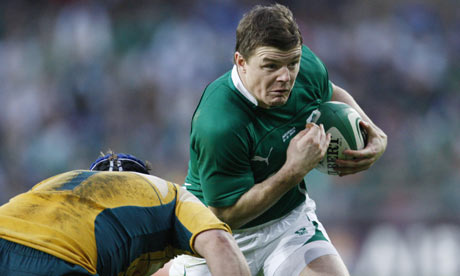
Brian O'Driscoll marked his 100th international appearance with a try from the last move of the match that salvaged a draw for the Six Nations champions, but until then the Ireland captain had been unusually inconspicuous after handing Australia a try in the opening minutes when he knocked on in his own 25.
If a draw was as much as Ireland deserved – they never held the lead and they got away with John Hayes collapsing the scrum that O'Driscoll's try was created from – there was more than a touch of the experimental about them. The chief characteristic of their play in last season's Six Nations was an aversion to risk-taking: they kicked long and often, played for territory and had the most unyielding defence in the tournament.
They ran kickable penalties in the first half only to be undone not so much by their new-found ambition as a rustiness after an eight-month lay-off. The understanding was not quite there, but they tested Australia in a way England never threatened to the previous week and while the result between the grand slam winners and the side that finished at the bottom of the Tri-Nations looks on the surface an indictment on European rugby, there was a considerable amount for Ireland to take from the game.
"We tried a few things and learned a lot about ourselves," said O'Driscoll. "It was difficult to click after not playing together for so long."
The reason they trailed so early on was that they moved the ball from their own 25 and O'Driscoll fumbled Ronan O'Gara's long pass, leaving Drew Mitchell with an unopposed run to the line. They would not have tried such a move so early in a tournament and even when they had a man advantage in the final 10 minutes of the opening half after Wycliff Palu had been sent to the sin-bin for leading with his shoulder in a tackle on Rob Kearney, they looked for seven rather than three points and their reward was to salvage a try at the moment Australia thought their grand slam quest was staying alive.
Ireland may well need to fall back on a running game in this year's Six Nations because their scrum was destroyed. John Hayes was playing his first match in more than a month after returning from suspension, while Cian Healy was making his debut on the loose-head, but so scant are resources up front that both players remained on the field for the full 80 minutes.
Australia did not just target Hayes in the scrum. They rarely missed an opportunity to run at, and past, the prop in midfield and the lock Donncha O'Callaghan also found himself exposed. Matt Giteau and Quade Cooper played with their heads up and their second try, 16 minutes from the end of normal time, was an example of how attack can prevail over defence in the modern game.
Australia used players lying flat in midfield as a decoy from a ruck, Cooper came from deep to take the ball which was quickly moved left and the prop Ben Alexander received and passed in one movement leaving his captain, Rocky Elsom, who was returning to Dublin six months after helping Leinster win the Heineken Cup, with just enough room to touch down in the corner and restore his side's seven-point lead.
Ireland had drawn level five minutes earlier when Healy, a handful with the ball in hand, charged through five tackles to start a sequence of phases that saw Paul O'Connell, Stephen Ferris and Healy held up just short of the line before Tommy Bowe was freed on the right. The scrum-half, Tomas O'Leary, supplied the pass, as he was later to do for O'Driscoll, but he personified his side with a varied performance.
Ireland's approach meant that they conceded position, if not possession. They trailed 10-6 at the break, two O'Gara penalties bringing them back to within a point after the early giveaway before Giteau landed his first penalty on an afternoon when he crucially missed two kicks at goal.
Ireland's enterprise and lineout dominance were undone by a tendency to get turned over at the breakdown where Australia vigorously counter-rucked. A glut of penalties slowed play down in the opening half, but there was more flow in the second period.
Elsom's try looked to have sealed it for Australia, but Ireland kept running and, after Bowe had been held up over the line after coming into midfield from his wing and running between Cooper and Digby Ioane, the home side had one final scrum. Australia drove forward, Hayes went down on his right knee but play went on and as O'Leary held the ball and pondered his options, he picked out a flat O'Driscoll who had a free run to the line and scored under the posts for O'Gara to convert.
The Australia coach, Robbie Deans, was a study in misery when he said: "It was a step up from England, but Ireland escaped." O'Driscoll did and Ireland's unbeaten record this year remains intact.
Ireland: Kearney (Leinster); Bowe (Ospreys), O'Driscoll (Leinster, capt), P Wallace (Ulster), Fitzgerald (Leinster; Earls, Munster, 56); O'Gara (Munster), O'Leary (Munster); Healy (Leinster), Flannery (Munster), Hayes (Munster), O'Callaghan (Munster), O'Connell (Munster), Ferris (Ulster; Leamy, Munster, 56), D Wallace (Munster), Heaslip (Leinster).
Tries Bowe, O'Driscoll. Cons O'Gara 2. Pens O'Gara 2.
Australia Ashley-Cooper (O'Connor, 73); Hynes, Ioane, Cooper, Mitchell; Giteau, Genia; Robinson, Moore (Polota-Nau, 66), Alexander, Horwill, Chisholm, Elsom (capt), Pocock, Palu.
Tries Mitchell, Elsom. Cons Giteau 2. Pens Giteau 2.
Sin-bin Palu 30
Referee J Kaplan (South Africa). Attendance 69,668.

